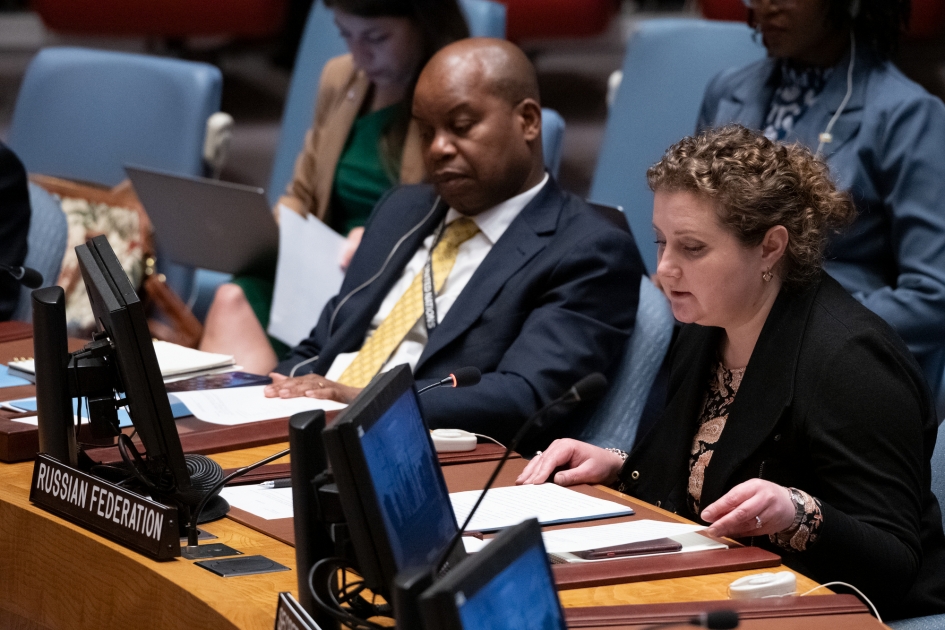Statement by Deputy Permanent Representative Anna Evstigneeva at UNSC briefing on the situation in Sudan
Mme.President,
We thank the AU Commissioner for Political Affairs, Peace and Security, Mr. Adeoye Bankole, and IGAD Executive Secretary, Dr. Workneh Gebeyehu, as well as SRSG Perthes for the briefings. We welcome the Permanent Representative of Sudan, Ambassador Al-Harith Idriss, to this meeting.
Russia is deeply concerned over the dangerous developments in Sudan. The hostilities that flared up on 15 April 2023 among the regular army of Sudan and the rapid support forces (RSF) caused numerous casualties. A very complex humanitarian situation is unfolding. The flows of refugees and IDPs are on the rise. Further escalation is fraught with both deteriorating security in Sudan and destabilization in its neighboring states, many of which already find themselves in a very vulnerable situation, meaning that they may be struggling with their own conflicts, receiving international assistance, hosting peacekeeping or special political missions.
Mme.President,
In order to respond effectively to the current crisis in Sudan, we need to understand its root causes and analyze the steps that triggered this outbreak of antagonism. We think that the conflict has been caused largely by a mismanagement as regards the political settlement in Sudan. A lot of responsibility for that rests with those Western states who believed for a long time they may interfere in the internal affairs of the country. Instead of allowing the political process to remain internal and Sudan-owned, they would rather impose on the Sudanese some pre-cooked solutions that were not based on the national political culture of Sudan and were not accepted by broader population. Unfortunately, the UN Integrated Transition Assistance Mission in Sudan (UNITAMS) also was pushing for transfer of authority to civilian forces. We have pointed out repeatedly that not enough effort has been made to attract international financial assistance for the much-needed socio-economic stabilization of the country. On the contrary, Sudan has been deprived of such assistance as "punishment." The assistance was made conditional on meeting artificial deadlines and obtaining consent to dubious "democratization” schemes.
We still proceed from the assumption that the Sudanese should have the perfect right to make decisions concerning the future of the country and its people, and to be fully responsible for such decisions. Many structural problems of the Sudanese society stem from the colonial legacy and have to do with consolidation of the state. This discussion reaches beyond the framework of the current crisis and constitutes a long-term task, however without this discussion, it will be very hard to ensure a lasting stabilization in the country.
Mme.President,
We call on the Sudanese sides to demonstrate political will and take immediate steps to put an end to this armed confrontation. We assume that all contradictions may be resolved at the negotiations table. The Sudanese have enough political wisdom and expertise to do that.
We welcome regional efforts for providing support to Sudan. We should give them room and time, stay in touch with regional states and support their steps. We must prevent the repetition of Libya’s scenario, when a forceful interference led to a disaster and destabilized half the continent.
The signing in Jeddah of the Declaration of Commitment on the Protection of Civilians and the agreement on a seven-day humanitarian ceasefire by the Army leadership and the RSF was a step in the right direction.
Sudan has always been our friend, so Russia maintains contacts with the Sudanese stakeholders. If needed and requested, we stand ready to provide assistance, but we will not interfere in domestic affairs. The Russian Embassy in Khartoum keeps working despite serious security challenges.
At this point, it is critical that all mediators should act in the same vein regardless of their possible national interests. We do hope that the measures that are being taken will create the necessary conditions for stabilization and resetting the political process on an inclusive basis. Attempts to influence the situation by force, including by illegitimate unilateral restrictions, are counter-productive.
Speaking of future activities of UNITAMS, given the current situation on the ground, we believe that now is not the time to complicate the parameters of the UN assistance. The current mandate could be technically extended and the main role could be assigned to national and regional efforts. Then, once the acute phase has passed, we could revisit the mandate. Providing humanitarian assistance to the people of Sudan and the neighboring countries that have generously opened their borders will be crucial.
Thank you.
Right of reply:
The statement by the representative of France gave another proof to what I was saying earlier today.
The international community, under which notion our Western colleagues only mean themselves, is never guilty of anything. They only bring “peace” and “democracy”. This, however, never leads up to stability. This is how “peace and democracy” were brought to Libya, Somalia, and other places across the globe. As for France’s “peaceful economic” efforts in Africa, well, volumes have been written on the subject.
Thank you.
